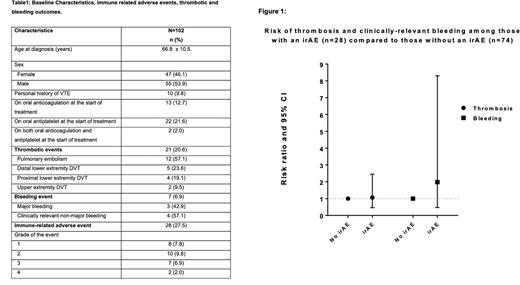Abstract
Introduction: Venous thromboembolisms (VTE) frequently occur in cancer patients, and the role of immune checkpoint inhibitors on thrombotic risk has been a rising concern for clinicians. Identifying pro-thrombotic risk factors could guide primary prophylaxis strategies in patients receiving immunotherapy. Immune checkpoint blockade can induce inflammatory side effects known as immune-related Adverse Events (irAE). Inflammatory states are known to be associated with a hypercoagulable state. It is not established whether patients treated with immunotherapy experience a higher risk of thrombotic events during periods of increased inflammation surrounding irAE occurrence. Similarly, while immune checkpoint inhibitors have been shown to be associated with increased bleeding events, it is not clear whether irAE occurrence affects incidence of hemorrhage. Our primary objective was to determine the association between irAE and thrombosis in patients with non-small cell lung cancer treated with immune checkpoint inhibitors in order to better elucidate potential risk factors for thrombosis in patients on immunotherapy. Our secondary objective was to evaluate the association between irAE and clinically significant bleeding events.
Methods: We identified all patients with non-small cell lung cancer treated with pembrolizumab at an academic medical center between 2016 and 2021. Outcomes of interest were VTE and clinically relevant bleeding (a composite of major bleeding and clinically-relevant non-major bleeds). We collected information regarding concurrent chemotherapy use with immunotherapy, frequency and type of irAE, steroid use for treatment for irAE, and use of anticoagulation or antiplatelet agents. We used logistic regression to calculate the odds ratios (OR) and 95% confidence intervals (CI) of VTE and clinically-relevant bleeding among patients who had an irAE prior to the outcome of interest compared to those who did not. We calculated the odds of VTE associated with use of concurrent chemotherapy (vs. no concurrent chemotherapy).
Results: Of 102 patients included, 46.1% were female, and average age at diagnosis was 66.8 ± 10.5 years. Thirty-four patients were treated with pembrolizumab alone, with the remainder receiving concurrent chemotherapy and/or targeted therapy with pembrolizumab. Overall, 21 patients experienced thrombotic events (20.6%), 7 (6.9%) experienced clinically-relevant bleeding events, and 28 (27%) experienced an irAE. (Table 1). Overall, occurrence of irAE was not associated with increased odds of VTE (OR: 1.07, 95% CI: 0.37-3.11, P=0.90). (Figure 1). Similarly, among those with an irAE, steroid treatment was not associated with increased odds of VTE (OR: 1.14, 95% CI: 0.17-7.69, P=0.89). The combination of chemotherapy with pembrolizumab did not result in a statistically significant increase in odds of VTE (OR: 1.37, 95% CI: 0.52-3.60, P=0.53). The odds of clinically-relevant bleeding was not statistically higher among those with an irAE (OR: 2.10, 95% CI: 0.44-10.0, P=0.35).
Conclusions: The development of irAE in patients with NSCLC treated with pembrolizumab does not appear to predict the development of VTE.
Disclosures
Neuberg:Madrigal Pharmaceuticals: Current equity holder in private company. Rangachari:AstraZeneca: Consultancy; Bristol Myers Squibb: Research Funding; Novocure: Research Funding; AbbVie/Stemcentrx: Research Funding; Teladoc: Consultancy; DynaMed: Consultancy. Zwicker:Sanofi: Consultancy; CSL: Consultancy; Quercegen: Research Funding; Portola: Honoraria; Pfizer/BMS: Honoraria; Incyte: Research Funding; Parexel: Consultancy; Daiichi: Honoraria. Costa:Daiichi Sankyo: Research Funding; Grand Rounds by Included Health: Consultancy; Tesaro: Research Funding; Merrimack Pharmaceuticals: Research Funding; Bristol Myers Squibb,: Research Funding; Blueprint Medicines: Consultancy, Honoraria; Janssen: Consultancy, Honoraria; Merck Sharp and Dohme: Research Funding; Teladoc: Consultancy; Spectrum Pharmaceuticals: Research Funding; Clovis Oncology: Research Funding; Pfizer: Consultancy, Honoraria, Research Funding; Takeda/Millennium Pharmaceuticals: Consultancy, Honoraria, Research Funding; AstraZeneca: Consultancy, Honoraria, Research Funding.
Author notes
Asterisk with author names denotes non-ASH members.


This feature is available to Subscribers Only
Sign In or Create an Account Close Modal